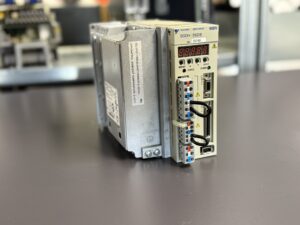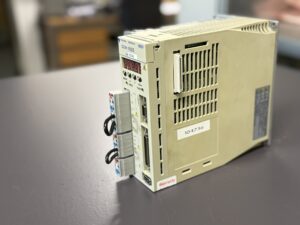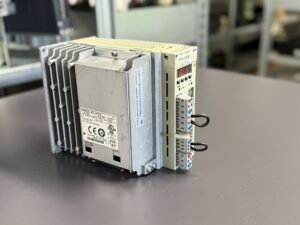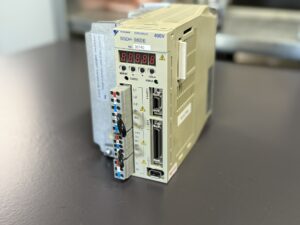15.05.2025 by Viktor Siebert
Repair story of a Yaskawa SGDH-05DE AC Servopack
We received a Yaskawa Servopack type SGDH-05DE showing error AC.9. Before coming to us, the customer had already tried his luck with an authorized Yaskawa service partner, unfortunately without success. The error persisted, and the customer continued using the drive for years, simply accepting the recurring issue.
The fault appeared every few days: during operation, the axis suddenly stopped, and the Servopack displayed alarm AC.9 (Encoder Communication Error). Each time this happened, the customer had to switch the machine off and on again to continue working. The customer reported that the issue occurred more frequently during the summer months.
Recently, after a longer downtime, the customer decided to search again for a solution and eventually came to us. We were already familiar with this particular error, as we had successfully repaired several units showing the same problem.
The Yaskawa Sigma-II series is among the most frequently repaired equipment in our workshop. As a result, we’ve developed comprehensive test setups, and our development team has analyzed nearly every kind of fault, precisely locating the causes and reliably fixing them. This allows us to carry out both high-quality and preventive repairs.
Although the device had previously been checked and allegedly overhauled by an authorized service provider, we could not find any significant work performed on the unit apart from the replacement of a few electrolytic capacitors.
This clearly demonstrates that merely testing and localizing faults is not always sufficient. One must also carefully inspect components that have reached the end of their useful life. Even if such components still show acceptable measurement values, they may already be nearing failure. Hence, we always recommend a preventive approach: Known critical parts should be routinely replaced, regardless of whether the fault is permanent or sporadic.
The AC.9 error itself is quite tricky. It indicates a loss or interruption in the communication with the encoder, often leading to incorrect assumptions. Usually, the encoder cable is replaced first, followed by the motor – exactly what our customer did as well. He initially replaced the servo power cable and later even the entire motor, which cost him several thousand euros.
However, the real cause was located within the Servopack itself: certain electronic components exhibited a drift influenced by temperature and humidity. This explains why the error appeared more frequently during summertime. Only our preventive repair approach could permanently resolve the issue.




Further information such as price and delivery time for:
Yaskawa SGDH-05DE AC Servopack
More details about our Yaskawa repair expertise can be found here: Yaskawa SIGMA II repairs by Industrypart
Similar models we regularly repair:
SGDH-05DE-OY
SGDH-05AE-OY (200V Type)
Technical specifications Yaskawa SGDH-05DE
| Parameter | Value |
|---|
| Model | SGDH-05DE (Sigma-II Servopack) |
| Input Voltage | 3~ 380–480 VAC, 50/60 Hz (±10% / -15%) |
| Rated Input Current | 2 A |
| Output (Rated) | 3~ 0–480 VAC, 0–300 Hz, 1.9 A (rms) |
| Output Power | 0.5 kW (for servomotor ~0.45 kW) |
| Feedback | 17-bit Incremental Encoder (standard) |
| Ambient Conditions | 0–55 °C, max. 90% rel. humidity |
| Dimensions (W×H×D) | approx. 110 × 180 × 160 mm |
| Weight | approx. 2.8 kg |
Alarms and Troubleshooting
Yaskawa Sigma-II series Servopacks continuously monitor various parameters and can enter an alarm state when deviations occur. In the event of a fault, the SGDH-05DE switches off the motor and displays an alarm code (format “A.xx”) on the display. This code can be read by a technician and provides insight into the type of fault. Below are some typical alarms according to the manual, including their meanings, common causes, and recommended actions:
| Alarm Code | Meaning | Cause | Recommended Action |
|---|
| A.10 | Overcurrent / Overheating | Short circuit at motor terminals or servopack overloaded/overheated (IGBT overcurrent, heatsink temp. >55 °C) | Check wiring; let cool down, reduce load; if necessary, repair servopack |
| A.30 | Regeneration Error | Fault in internal braking chopper circuit or defective external braking resistor | Check braking resistor and chopper circuit; replace defective components |
| A.32 | Regenerative Overload | Excessive regenerative energy (braking) – resistor overloaded or insufficiently rated | Install larger/additional braking resistor; increase deceleration ramps |
| A.40 | DC Bus Overvoltage | DC link voltage too high (e.g., power transients or strong energy regeneration during braking) | Check supply voltage; dissipate braking energy if necessary (larger resistor or longer deceleration time) |
| A.41 | DC Bus Undervoltage | DC link voltage too low (missing or insufficient supply voltage) | Check power supply (phase failure, voltage level) |
| A.71 | Overload: High Load (short-term) | Motor operated for several seconds under significantly excessive load (>>100% rated torque) | Reduce load; check application; possibly use a larger motor/drive |
| A.72 | Overload: Continuous Load | Motor operated continuously over longer periods at slightly above rated torque (>100%) | Reduce load; use larger motor/servopack |
| A.83 | Absolute Encoder Battery Weak | Battery for absolute encoder nearly depleted | Replace battery promptly (backup data beforehand) |
| A.C9 | Encoder Communication Error | No communication possible with motor encoder (cable break, defective encoder or faulty servopack electronics) | Check encoder wiring; replace motor/encoder if necessary; if fault persists, repair servopack |
| A.F1 | Power Supply Phase Loss | Failure of one phase of the 3~ power supply | Check power connection and fuses (ensure all phases are present) |